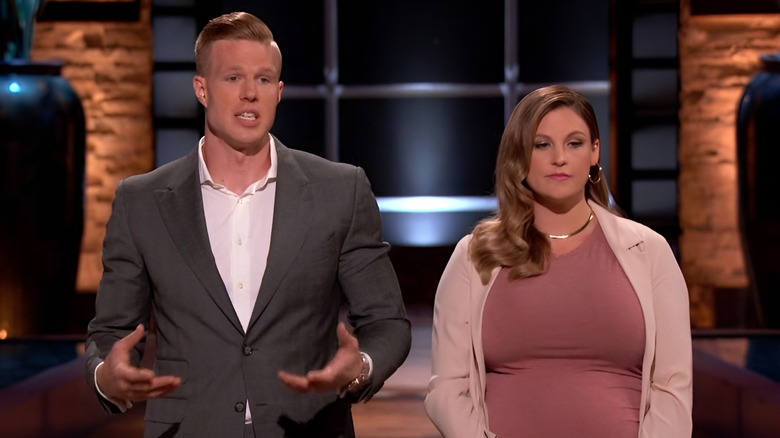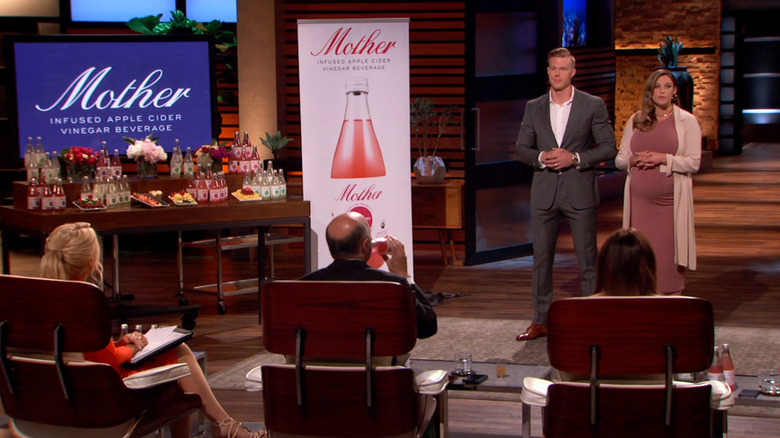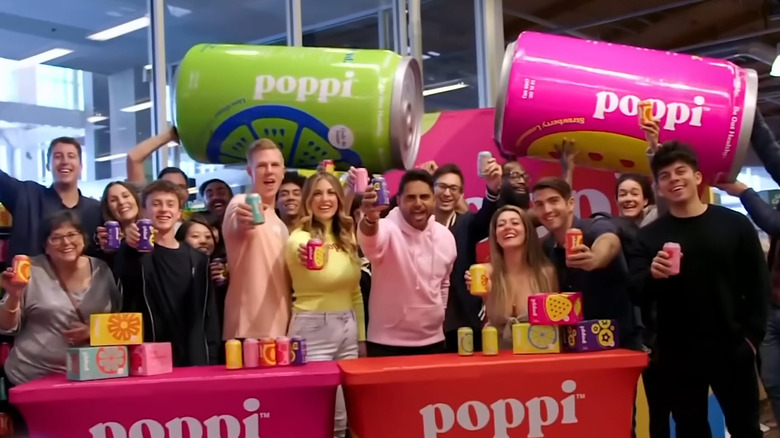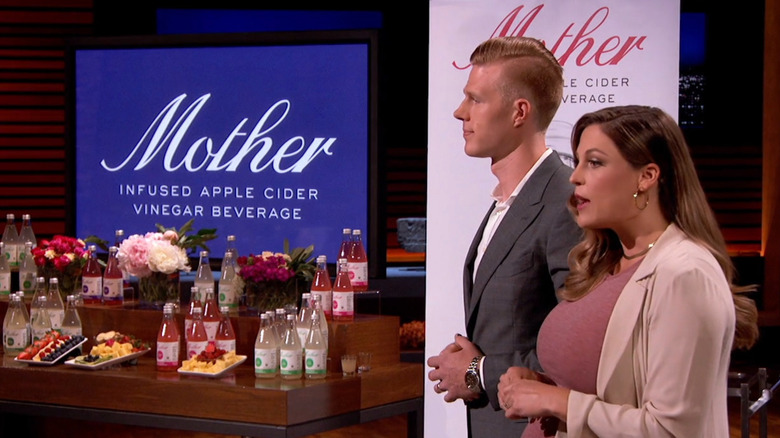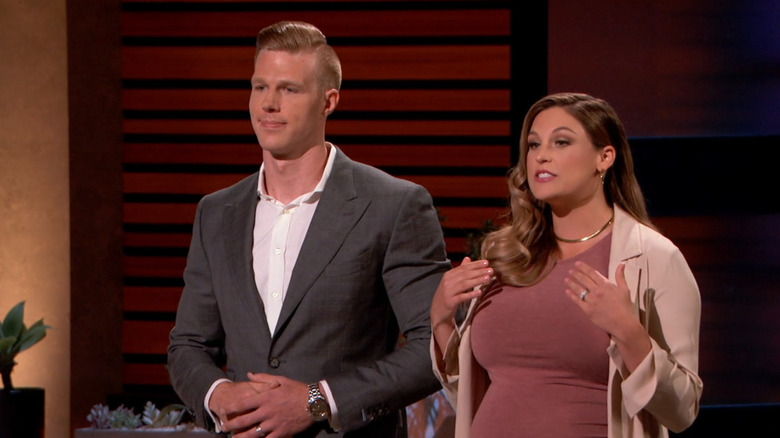Whatever Happened To Poppi After Shark Tank?
Typical sodas and soft drinks are steadily starting to lose their appeal in today's increasingly health-conscious market. This has allowed new players to throw their hats in the ring with healthier alternatives, one of them being the "Shark Tank" company, Poppi, though it was called Mother when they appeared on the show. The brand has created its own line of soda using fruit juices, prebiotics, and, most importantly, apple cider vinegar. The latter ingredient is an effective bacteria killer, improves your immune health, lowers blood sugar, and aids in weight loss, amongst its myriad of other health benefits. Additionally, Poppi contains significantly less sugar and calories than traditional sodas.
Co-founder Allison Ellsworth was in need of apple cider vinegar's advantageous qualities. While suffering through a host of skin and stomach issues, she began taking the twice-fermented beverage regularly. In nearly no time at all, she says she found the relief she was looking for but couldn't stand the taste. From there, she and her husband Stephen went to work on developing a more palatable iteration, even investing $15,000 of their life savings into the venture.
Initially, the Dallas-based couple sold their concoction at local farmers markets. There, they caught the eye of a Whole Foods representative, who encouraged them to get it into their stores. They proceeded to quit their jobs at the oil and gas firm Nomadic Land Services and commit to the operation full-time. In 2018, they appeared on the hit series "Shark Tank" in an effort to keep their newfound passion alive.
What happened to Poppi on Shark Tank?
Allison and Stephen Ellsworth are seeking a $400,000 investment in exchange for 10% of Poppi. The Sharks take a shot of the beverage sample they have, only to gag upon discovering that it's pure apple cider vinegar. The couple then shares samples of their drink, which the investors seem to like more, although Mark Cuban makes faces at one of the flavors.
The Sharks are sold on Poppi's health aspects but want to know about the business itself. The company has been operating for 18 months at this point and has earned a total of $500,000 in sales, with projections of $1 million by year's end. They have secured space in 200 Albertsons locations, alongside the Dallas-Forth Whole Foods stores they're in already. Each bottle has a retail price of between $2.99 and $3.59 while costing between $0.78 and $0.85 to produce. Beverage companies on "Shark Tank" are always a tricky proposition, and Kevin O'Leary turns to guest shark Rohan Oza — who's worked with brands like Coca-Cola and Smartwater — to get his opinion. Oza explains that big brands like to team up with entrepreneurs as opposed to making new drinks themselves.
With a $600,000 valuation, they've raised $125,000, which was primarily used to kickstart production. Poppi produces 60,000 bottles a month but has made arrangements with a larger facility that can turn out 200,000 a week. Both Kevin O'Leary and guest shark Bethenny Frankel think manufacturing is a bad road to go down, and they go out. Mark Cuban and Lori Griener are similarly concerned about the competition and exit the deal. Oza proposes $400,000 for 25%, and, without argument, the two accept.
Poppi after Shark Tank
As exciting as it was for Allison and Stephen Ellsoworth to strike a deal with Rohan Oza on "Shark Tank," there were some challenges on the horizon. In a Season 11 update segment, they share that they ran out of stock within hours of the episode airing on December 9, 2018. Allison, who was nine months pregnant at the time of filming, had her baby 12 days later.
They soon found that the product's original name, Mother, was unable to be trademarked. This allowed them the opportunity to do a major rebrand, which birthed their current name, Poppi. Oza was so thrilled by the name and design pivot that he increased his contributions to the company. "I love how this whole package turned out," Oza said. "The design — it's almost like an artist designed it. You want to grab it, you see it on shelves you want to gravitate to it. I love the brand so much I've doubled the investment." However, given the extensive amount of time these upgrades took, Poppi had to turn down several distribution and retail opportunities. Even with the delay, the company still brought in $1 million in the year following "Shark Tank."
In early 2020, Poppi debuted in 1000 nationwide locations, including Whole Foods, Lifetime Fitness, and Sprouts. The COVID-19 pandemic halted some of its retail potential, but the company managed to find success even during this tumultuous time. By pivoting to using online food delivery sites, Poppi succeeded in gaining traction with consumers who were looking for ways to stay healthy while stuck at home. Additionally, they donated supplies of Poppi to hospitals and various communities within New York.
Is Poppi still in business?
Business has been booming for Poppi. A trip to its website reveals a wide assortment of flavors, including orange, watermelon, grape, and cherry limeade, to name a few. Buyers can either purchase a 12-pack of any single flavor or a selection of variety packs, with prices ranging from $23.90 to $29.99. Additionally, you can find Poppi at many major retailers, including Target, Walmart, Publix, Whole Foods, Sprouts, and Kroger. The beverage is also available on Amazon, where it currently ranks as the top-selling soft drink on the site, besting long-established brands such as Canada Dry, Pepsi, and even Coca-Cola.
What's fueled Poppi's rampant success? There's no doubt that "Shark Tank" led to a big boost in the episode's immediate aftermath, but it's been Poppi's recent social media efforts that have given it new life. While Poppi's following on Instagram and Facebook is nothing to laugh at, it's TikTok that has provided the furthest reach. In early 2021, a video on the platform by co-founder Allison Ellsworth detailing Poppi's backstory went viral, and sales skyrocketed as a result. Currently, the company's TikTok has nearly 350,000 followers and 4 million likes.
This explosion has also helped Poppi gain some notable sponsors, with such celebrities as Olivia Munn, Miley Cyrus, Justin Timberlake, Ashton Kutcher, and Billie Eilish all fans of the brand. Some of these names have even put their money where their mouth is, with the Chainsmokers and Ellie Goulding part of the $13.5 million Series A2 investment round in 2021. Another $25 million was raised in a Series B financing round, bringing Poppi to $53 million in total capital by the end of 2022.
What's next for Poppi?
Poppi has not only found success on its own merits, it may even have the potential to top its competitors in some major ways. The team has more than proven their willingness to pivot their business model and strategy to fit the current market, a crucial factor in determining any company's longevity. And that team continues to grow; a LinkedIn post from Poppi covering its recent National Meeting stated, "To think, just three years ago we were a team of two in the kitchen. Now, we are so grateful for our incredible team of 100+ employees — 2024 here we come!"
Before that, however, the team has some mighty ambitions for the remainder of 2023. Following their success breaking into Walmart, co-founder Allison Ellsworth has stated that they aim to amp up their direct-to-store delivery system and appear in 30,000 new locations by the end of 2023 as a way of increasing nationwide expansion. And even if they don't hit that goal by year's end, the Poppi team nevertheless sees a bright future for the brand.
In the Season 11 "Shark Tank" update segment, investor Rohan Oza expressed his own aspirations for what Poppi can become. "I want to have the first billion-dollar brand on 'Shark Tank,'" Oza shared. "I think Poppi has that potential." Coming from someone whose catalogue is full of booming beverage brands, that's not a statement to be taken lightly. Time will tell if Poppi reaches this milestone, but there's no doubt that the company will continue to do whatever it takes to thrive.
